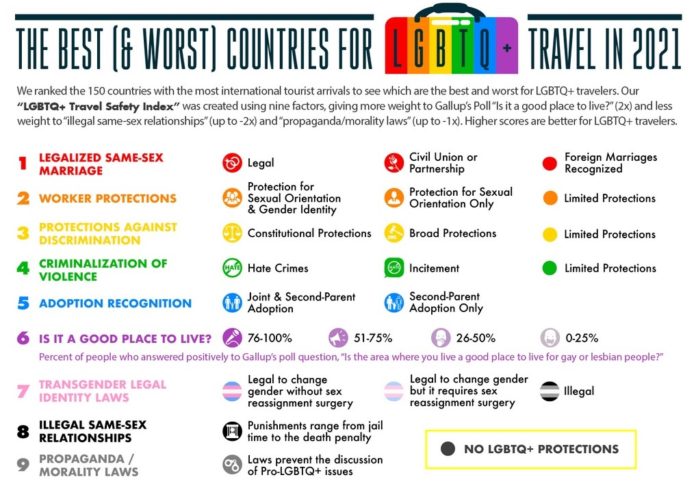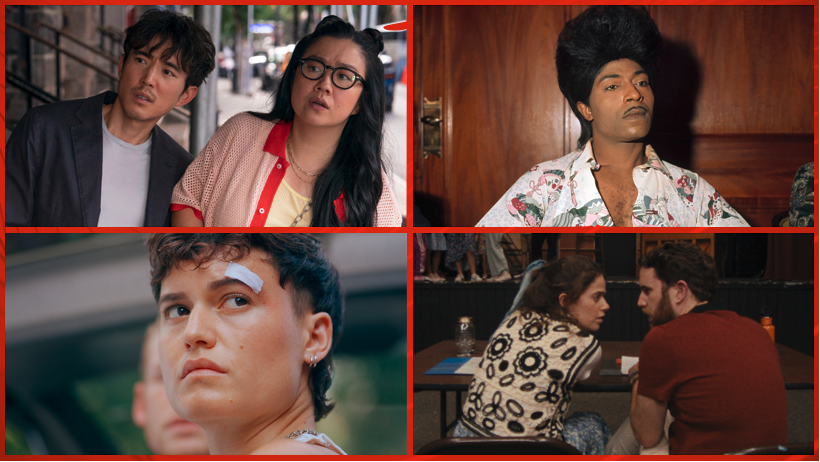March 9, 2021 – When it comes to traveling, Croatia has been known as a gay-friendly destination, even though not all Croatians in every part of the country are fond of accepting gay and lesbian couples. In a recent study, LGBTQ travel safety in Croatia ranks 39th on the list of 150 world’s most popular countries for LGBTQ+ travel.
The research has been conducted by Asher and Lyric Fergusson, an Australian-American married couple, who write and do the research studies on topics that help travelers to travel safely. They have now taken an in-depth look at LGBTQ+ rights, country by country, reviewed individual laws and gathered data from various trusted international sources to create the definitive “LGBTQ+ Travel Safety Index” that shows safest, as well as least safe countries for LGBTQ+ travel.
After more than 250 hours of research, they made a list of 150 most (and least) popular countries, where Croatia took 39th place. We reviewed the information brought out about Croatia and added some useful information about LGBTQ+ communities in Croatia.
Croatia in the first third of best countries for LGBTQ+ safety
In a comprehensive overview, researchers listed 150 countries from worst to best regarding travel safety for LGBTQ members. The criteria according to which they made a list consists of ten critical factors:
- Legalized same-sex marriages
- Worker protections
- Discrimination protections
- Criminalization of violence
- Adoption recognitions
- Quality of life
- Transgender legal identity laws
- Illegal same-sex relationships
- Morality laws

Source: Asherfergusson.com
According to the data collected by these criteria, the researchers gave Croatia an index of 188 points and a grade C+ from most safe to highest dangerous places (A to F), placing it among the first third of the best countries in the world in terms of LGBTQ+ safety.
In Croatia, the same sex-relationships are legal since 1977. However, same-sex marriage or families are not permitted, but same-sex life partnership is (i.e., civil union). The Life Partnership Act came into force back in 2014, and since then, hundreds of life partnerships have been concluded, with male life partnerships being slightly more common than female. Also, it is legal to change gender without sex reassignment surgery.
Violence against the members of the LGBTQ community is considered a hate crime in Croatia. Although this study says only sexual orientation is protected in Croatia, the truth is, both sexual orientation and gender identity are protected by numerous Croatian laws. The protections against discrimination are broad, although not constitutional. Croatian Constitution still does not include same-sex families, defining marriage only as “a life-long community of woman and man.” However, one year ago, the Constitutional Court gave the right to same-sex couples in Croatia to be foster parents. Before, only single gay people could adopt children.

Source: Asherfergusson.com
The top ten safest countries for LGBTQ+ travel are Canada, the Netherlands, Sweden, Malta, Portugal, Belgium, the United Kingdom, Spain, Norway, and France. At the very end of the list, being the world’s least safe countries for LGBTQ+ travel are Nigeria, Saudi Arabia, Malaysia, Malawi, Oman, Jamaica, Myanmar, Qatar, UAE, and Yemen.
Interestingly, the study shows that less than 25 percent of people said Croatia was a good place to live, according to Gallup’s poll question’s votes. These statements are arguable since one can experience life and circumstances in Croatia only by visiting it personally. Nonetheless, many places in Croatia have been gay-friendly for a long time, especially tourist destinations.
LGBTQ-friendly destinations in Croatia
Among Croatia’s popular tourist destinations, Dubrovnik is considered the most LGBTQ-tolerant, while its neighboring island of Lokrum welcomes gays on nudist beaches. Of other popular Croatian coastal destinations, Split, Rovinj, Krk, Rab, Rijeka, and Hvar also welcome members of the LGBTQ community. Rab island has also become the first declared gay-friendly destination in Croatia.
Naturally, any larger town in Croatia that depends on tourism is accommodating, and gay and lesbian couples won’t face discrimination. Some even go that far as to say that Croatia is one of the most tolerant countries in Europe for LGBTQ+ travelers. Meanwhile, people in smaller towns in rural parts of Croatia, due to their high traditional and religious values, tend to be very judgemental.
Last year, Croatia saw 66 new same-sex life partnerships, increasing for as many as 47 life partnerships than in 2019. Most of them were registered in Zagreb and Primorje-Gorski Kotar and Istria counties. The first gay marriage was even held in Slavonia, in Kutjevo, where such marriages are still not very well accepted among citizens, which gained a lot of interest there.
Bigger cities such as Zagreb find same-sex marriages and LGBTQ communities acceptable, as proven by the Zagreb Pride celebration of many years standing, even in pandemic-marked 2020. Still, a recent horrific hate crime perpetrated in Zagreb’s Maksimir Park against a gay man, when two attackers threw a Molotov cocktail on him and caused him second-degree burns. Zagreb Pride association later condemned the attack, calling it the “worst anti-gay hate crime ever reported in Croatia.” They and such associations, most of which are located in Zagreb, are trying to improve the position of LGBTQ people in the community, i.e., in Croatia.
Pride celebrations have also been organized in Croatian cities of Split and Osijek, while some other supporting celebrations occasionally happened in Rijeka and Pula as well. Also, Croatia’s numerous music festivals and carnivals always welcome LGBTQ music lovers.
Although not all Croatians are tolerant, nor does Croatia have all legal protections for gay or lesbian persons, it seems like times are slowly changing for the better in creating a safe and tolerant environment for LGBTQ+ people.
For the latest travel info, bookmark our main travel info article, which is updated daily.
Read the Croatian Travel Update in your language – now available in 24 languages.








